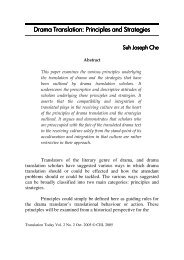Re-Evaluation of Lin Shu (the Chinese Translator) - National ...
Re-Evaluation of Lin Shu (the Chinese Translator) - National ...
Re-Evaluation of Lin Shu (the Chinese Translator) - National ...
Create successful ePaper yourself
Turn your PDF publications into a flip-book with our unique Google optimized e-Paper software.
156 <strong>Re</strong>-<strong>Evaluation</strong> <strong>of</strong> <strong>Lin</strong> <strong>Shu</strong> (<strong>the</strong> <strong>Chinese</strong> <strong>Translator</strong>):A Systemic Approach to Literary TranslationB. Ideology and <strong>the</strong> Translating Method Employed by <strong>Lin</strong><strong>Shu</strong>In <strong>the</strong> early modern China, translators, including <strong>Lin</strong> <strong>Shu</strong>mainly adopted domestication. <strong>Lin</strong> <strong>Shu</strong>’s choice <strong>of</strong> translatingmethod is primarily embodied in his constant adaptation <strong>of</strong> <strong>the</strong>original to <strong>the</strong> perceived needs <strong>of</strong> <strong>Chinese</strong> culture and <strong>the</strong>acceptability <strong>of</strong> his translations to <strong>Chinese</strong> readers. Here ideologyalso played a part in <strong>Lin</strong> <strong>Shu</strong>’s choice <strong>of</strong> translating method. <strong>Lin</strong>’sintention was to consolidate <strong>Chinese</strong> culture by applying Westernlearning.In early modern times, <strong>Chinese</strong> intellectuals looked toWestern civilization. Translation was prosperous and it attained aprimary position in <strong>the</strong> <strong>Chinese</strong> literary world. It was usual andpredictable for translators during that period to break traditional<strong>Chinese</strong> conventions and adopt <strong>the</strong> mode <strong>of</strong> foreignization.Never<strong>the</strong>less, translators including <strong>Lin</strong> <strong>Shu</strong> still conformed to <strong>the</strong>existing norms and employed <strong>the</strong> domesticating mode <strong>of</strong> translationfor <strong>the</strong> most part.. This was partly due to <strong>the</strong> necessity <strong>of</strong> <strong>the</strong> socialideology in early modern China as well as <strong>the</strong> traditional <strong>Chinese</strong>ideology. <strong>Lin</strong> <strong>Shu</strong> produced a domesticated translated texts for<strong>Chinese</strong> readers’ convenience. In Uncle Tom’s Cabin, somecharacters were reformed by Tom’s behavior and come to believe inChristianity. However, in its <strong>Chinese</strong> version, <strong>the</strong>ir change isexplained form <strong>the</strong> perspective <strong>of</strong> morality instead <strong>of</strong> Christianity.Unlike <strong>the</strong> original that demonstrates <strong>the</strong> victory <strong>of</strong> Christianity, <strong>Lin</strong><strong>Shu</strong>’s version shows that <strong>the</strong> change <strong>of</strong> Sambo and Quimbo is basedon <strong>the</strong> famous <strong>Chinese</strong> idea that human beings are born to be kind(Martha P. Y. Cheung, 2003: 17).<strong>Lin</strong> <strong>Shu</strong>’s main concern in his translating enterprises was notto be faithful to <strong>the</strong> original, but to follow <strong>the</strong> ideology <strong>of</strong> his timesand consolidate <strong>the</strong> traditional <strong>Chinese</strong> ideology. Thus he
















